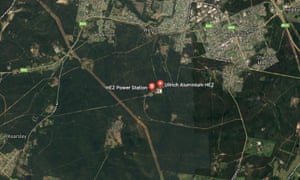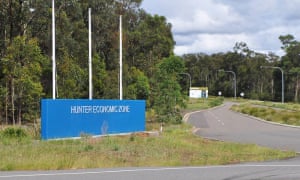Extract from The Guardian
Energy
Exclusive: Local mayor briefed that Hunter economic zone site in Kurri Kurri has been earmarked for 2,000MW plant
A deal has been signed to develop two massive new coal-fired power stations near Kurri Kurri in the New South Wales Hunter region, according to a Hong Kong-based investment firm.
Guardian Australia can reveal that local authorities – including the Cessnock mayor, Bob Pynsent – have been briefed about the unusual plans to turn the failed Hunter economic zone into a 2,000 megawatt coal power plant.
In a statement to the Hong Kong stock exchange late last week, the investment company Kaisun Holdings announced it had signed a memorandum of understanding with a Chinese state-owned power provider and a tiny Australian private company to build two 1,000MW power stations.
Kaisun works mainly in central Asia and describes itself as a “belt and road” expert. The company is based in Hong Kong but incorporated in the Cayman Islands.
It said the heads of agreement had been signed with a subsidiary of China Energy
– part of the company’s engineering group – and Cavcorp, a company
worth $25,000 on paper and wholly owned by the Parramatta businessman
Frank Cavasinni.Guardian Australia can reveal that local authorities – including the Cessnock mayor, Bob Pynsent – have been briefed about the unusual plans to turn the failed Hunter economic zone into a 2,000 megawatt coal power plant.
In a statement to the Hong Kong stock exchange late last week, the investment company Kaisun Holdings announced it had signed a memorandum of understanding with a Chinese state-owned power provider and a tiny Australian private company to build two 1,000MW power stations.
Kaisun works mainly in central Asia and describes itself as a “belt and road” expert. The company is based in Hong Kong but incorporated in the Cayman Islands.
Cavasinni is the also the director of a company that paid $5.5m in 2012 to buy a 70 hectare parcel of the Hunter economic zone, a largely failed proposal to stimulate the local economies of Kurri Kurri and Cessnock after a slowdown in local mining and heavy industry.
The businessman, now the major stakeholder in the HEZ, is also a director of the Hunter Investment Corporation that manages the development area. He has been contacted for comment.
Pynsent told Guardian Australia on Wednesday that Cavasinni had briefed him and the council’s general manager, Stephen Glen, about the plan.
“He outlined the project and told us that it was going to be lodged,” Pynsent said.
He said he had no philosophical objection to a coal-fired power plant but that the council would “need to have a look at it”.

A project of such scale is likely to need approval from the NSW government rather than the local council.
It would also likely require government underwriting or investment. Tim Buckley, from the Institute for Energy Economics and Financial Analysis, estimated a 2000MW power plant would cost between $4bn and $5bn, and require a government capital subsidy of about $2bn.
Buckley said the plan was “totally uncommercial, absent multi-decade subsidies to Chinese entities and protection from future emissions changes”.
The federal energy minister, Angus Taylor, said earlier this year said the government had received 66 submissions from power generation projects for taxpayer support. A spokesman for Taylor told Guardian Australia the government was aware of reports of the Hong Kong agreement.
“The government is not involved in this MOU,” the spokesman said.
“As there could be potential future approval processes, the government doesn’t propose commenting on this matter further.”
The statement to the Hong Kong stock exchange says the companies’ plan considered the development of two 1,000MW “ultra-super critical” coal-fired power plants and had subsequently signed a memorandum of understanding.
“As the initiator for the project, Cavcorp planned to develop the HEZ project,” it said. “[The China Energy subsidiary] will be the contractor of engineering, procurement construction and financing contract to be used for the project, and Kaisun will be the project coordinator.
“A special purpose project company will be established solely for this HEZ project, responsible for the development and operation.
“Kaisun is the introducer and coordinator of the project, and help to procure … potential investors for this project in Hong Kong, and or as required. They will also consider sponsoring the potential listing of the project in Hong Kong assembling relevant professional parties for the listing.”
The executive director of the investor-action group Market Forces, Julien Vincent, said the proposal said everything “about how broken climate change and energy policy is in Australia. Coal is not only an inferior economic option in today’s energy market, a new coal power plant would blow our climate change goals out of the water. But the nonsense we hear from politicians keeps space open for ludicrous proposals like this.”
Vincent said the proponents should expect community-led opposition to such coal projects and should look to Adani’s Carmichael coalmine as an example of that opposition.
“We’d be happy to compile a list of project risks on this basis for Kaisun Holdings to disclose on the Hong Kong stock exchange,” Vincent said.

No comments:
Post a Comment